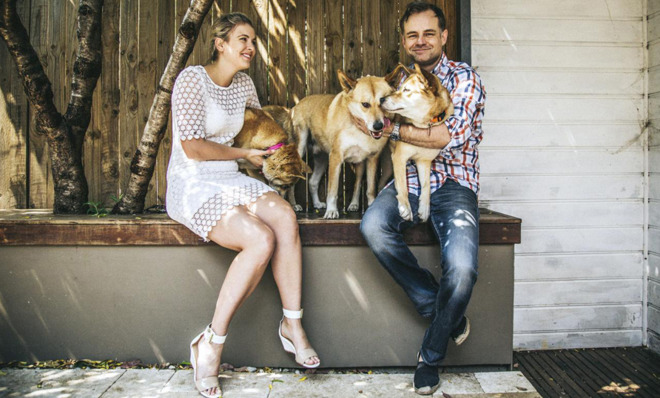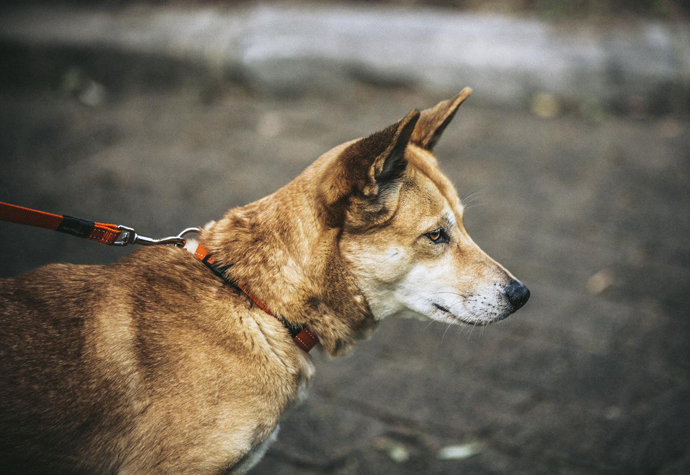Life with a pet dingo
Australia's prowling predator is either a vicious wild dog that attacks children and devours farm animals, or a loving and devoted pet as cuddly as a kitten. It just depends who you ask.

A free daily email with the biggest news stories of the day – and the best features from TheWeek.com
You are now subscribed
Your newsletter sign-up was successful

Matt Hutchings, 42, and his partner Desiree Hemberger, 31, look like your typical professional couple, and in many ways they are. Hemberger is a corporate consultant. Hutchings is a lawyer. They have no kids yet — "We're thinking next year," says Hemberger. They work long hours. Their small Victorian terrace house is set in the neighborhood of Newtown, a hub for the more eccentric members of Sydney society. In recent years though, the musicians and hippies have made way for young professionals with schnauzers on leashes and babies in Bugaboo prams. The first signal to visitors that something is different about the Hutchings-Hemberger household is at their front door. During the day, canine claws click-clack on the wooden floors while excited snufflings and whining are heard, but no barking. It's a different situation at night. When darkness descends and fruit bats fly through the air, one might hear three sets of piercing howls, a sign that the couple's pack of pure-bred pet dingoes — Gerda, Persephone, and Bear — are excitedly welcoming their owners home.
(More from Narratively: Bad dog/good dog)
Canis lupus dingo is Australia's only native dog species. They appear in archaeological records in Western Australian rock paintings and recent DNA testing suggests they may have been here as long as 18,000 years. Like wolves, dingoes are a primitive dog species — a living, breathing ancient ancestor of your pet pug. Since they are more closely related to a wolf than a pug, they are not, however, common pets. Mention you are on your way to visit some "pet dingoes" and you are likely to get a shocked response followed by questions about the danger involved.
The Week
Escape your echo chamber. Get the facts behind the news, plus analysis from multiple perspectives.

Sign up for The Week's Free Newsletters
From our morning news briefing to a weekly Good News Newsletter, get the best of The Week delivered directly to your inbox.
From our morning news briefing to a weekly Good News Newsletter, get the best of The Week delivered directly to your inbox.
Pet dingoes look deceptively like any other dog. The honey-colored trio wear collars. They walk on leashes. They visit the dog park. But it would be a mistake to lump them in the same basket as the fat Labrador across the road. Their inability to bark is just one of the many things distinguishing dingoes from their domestic cousins. "It can be disconcerting. As our plumber said, if they were barking it'd be fine. Their silence freaks people out," says Hutchings.
Also unlike typical domestic dogs, dingoes are used to highly developed social structures that require complex and high-maintenance relationships between the dogs and their owners. It is essential that Hutchings and Hemberger operate as part of the pack and subscribe to canine etiquette. The couple is expected to participate in an elaborate greeting process every night. Fifteen minutes must be spent celebrating the reunion — patting, talking, playing — to avoid deeply offending the canine trio. They are acutely sensitive. They sulk if they are told off, they hate when the couple fights, and they don't like to be separated from each other.

Hutchings plays the role of the alpha male and Hemberger is the alpha female, but it wasn't always that way. As a late arrival to the pack, Hemberger had to earn her place in the canine-human family. And it wasn't easy. They put her through her paces. ("Persephone used to constantly wee on my underwear!") It took three dates for Hutchings to even tell his new squeeze about his furry friends. "He hadn't even mentioned he owned dogs! We were sitting in a restaurant and the topic of dogs came up. And I asked what kind he had," says Hemberger. "He said dingoes and I almost fell off my chair. I called my mum and she said, 'Break up with him. Now! He is obviously crazy.'" Two months later the couple were living together and after some teething issues, she was smitten.
They are intensely affectionate. Gerda sleeps in the couple's bed. "When they like you they really like you," says Hutchings, watching as the 33-pound Persephone crawls into my lap, then intently and relentlessly licks my face and every inch of my arms to the point where I am at risk of being welcomed to death by her friendliness. "She is very maternal; she is grooming you!" laughs Hemberger. Bear pushes his head into my lap, looking for a pat, and is subjected to a low, menacing growl from his jealous sister. No pats allowed for Bear. He saunters off to sniff around the kitchen cupboards before settling down to sit on a rug. Gerda, the quiet, well-behaved "mature" dingo, watches on, ear raised, her beautiful almond-shaped eyes sleepy but still intently alert.
A free daily email with the biggest news stories of the day – and the best features from TheWeek.com
(More from Narratively: Where the bull never dies)
They find it very difficult to deal with change. Moving would be a nightmare. "We'd need to stay home with them for a week," says Hemberger. They can't be kenneled and due to their fierce bonds with their owners they can't be re-homed as they don't recover from the rejection. "The first time you go away they think you have died. They won't eat and they fret. The first time I went away for a period with work they were totally pissed off with me," says Hutchings. "They make great pets, but it is conditional on the fact you are not going to get sick of them and give them away after five years. You are not going to take them overseas or do anything drastic. You need to commit to the fact that it is a long-term commitment," says Hemberger. "They can live up to 18 to 20 years in captivity."
Hutchings and Hemberger know of at least five other pet dingoes living in neighboring urban areas. It's one of the many contradictions in the narrative of the Australian dingo that in New South Wales you don't have to have a special permit to own one as a pet. They are recognized under the 1998 Companion Animal Act as a domestic pet and like your neighbor's poodle, just need to be registered and microchipped. In three states you need a permit to own one. In other states the situation is darker. In Tasmania, Queensland, and South Australia if you are caught with one in your possession it will be confiscated and killed.
Four years ago, when Hutchings brought home two adorable six-week-old female dingo pups, he had no idea that he was unwittingly committing himself to a role as an urban ambassador for dingo rights. The questions began at Sydney Airport when airline staff balked after discovering the two fluffy puppies in the carrier were more wolf than Lassie. The couple finds themselves constantly fielding curious questions from the public and joke about creating matching T-shirts that say, "Yes, they are dingoes."
Jokes aside, Hutchings and Hemberger take their role as owners seriously. Dingoes have enough of an image problem as it is. They are widely associated with the pop culture catchphrase "A dingo ate my baby!" after the notorious 1980 case when a dingo was alleged to have killed a nine-month-old baby. The last thing dingoes need are more negative narratives added to the folklore.
(More from Narratively: The whiff)
Persephone and Bear, the two Alpine dingoes, are joined at the hip. They bicker and play like naughty siblings and pine when they are separated. Alpines have thicker coats than dingoes found in other areas of Australia and have been almost eradicated from the wild due to hybridization with wild domestic dogs and clashes with agriculturalists. Gerda is a desert breed with a finer pelt and a penchant for beds. She is more placid and athletic than the other two who sleep outdoors and can be destructive, ripping into couch cushions if left inside. The others are champion diggers, whereas Gerda can jump a seven-foot fence if she feels like it. And that's where we reach the real difference between dingoes and domestic dogs. Pet dingoes maintain their free will. They resist following orders. Ask them to fetch or sit on demand and they give you a "Why should I?" look just like a person would. You are a peer, not a master. Forget about trying to train them. Their fierce intelligence means they are more likely to end up training you. It's a privilege to know them, but forget thinking you ever truly own them.
"Matt is the boss or leader but they won't do what you say most of the time," says Hemberger. "Which is one reason we don't let them off the leash. You can call and whistle and do everything. But they remain their own master. They come to you if they want to."
Read the rest of this story at Narratively.
Narratively is an online magazine devoted to original, in-depth and untold stories. Each week, Narratively explores a different theme and publishes just one story a day. It was one of Time's 50 Best Websites of 2013.
-
 The EU’s war on fast fashion
The EU’s war on fast fashionIn the Spotlight Bloc launches investigation into Shein over sale of weapons and ‘childlike’ sex dolls, alongside efforts to tax e-commerce giants and combat textile waste
-
 How to Get to Heaven from Belfast: a ‘highly entertaining ride’
How to Get to Heaven from Belfast: a ‘highly entertaining ride’The Week Recommends Mystery-comedy from the creator of Derry Girls should be ‘your new binge-watch’
-
 The 8 best TV shows of the 1960s
The 8 best TV shows of the 1960sThe standout shows of this decade take viewers from outer space to the Wild West